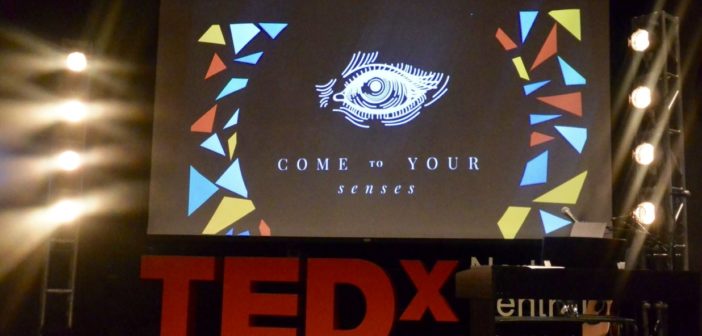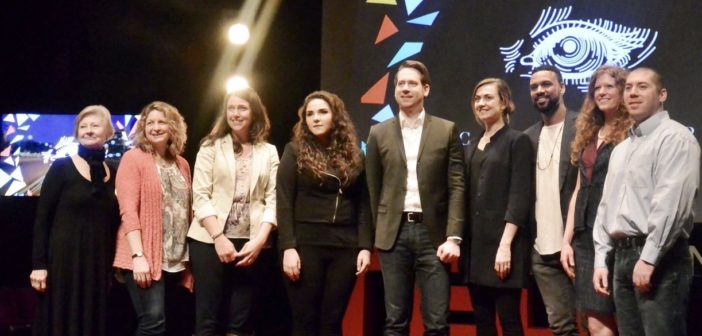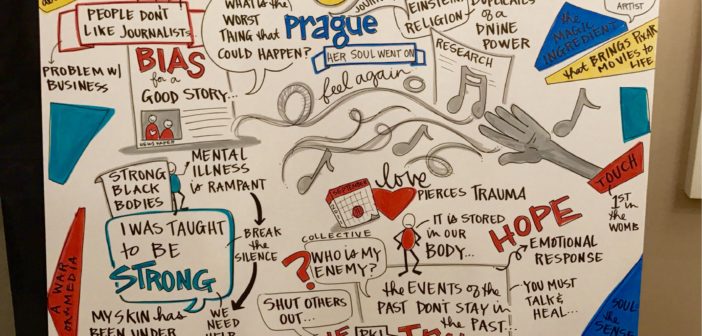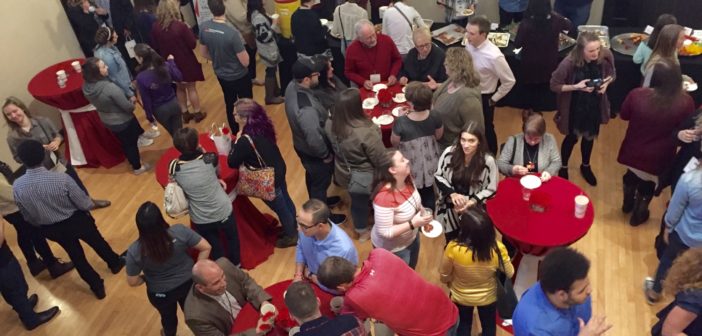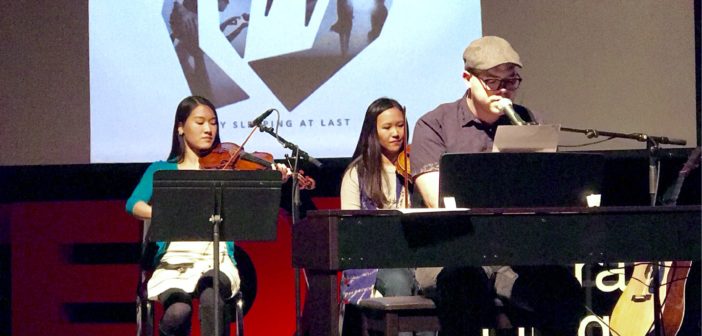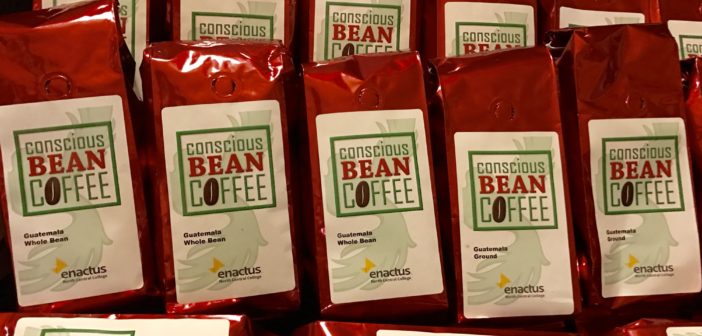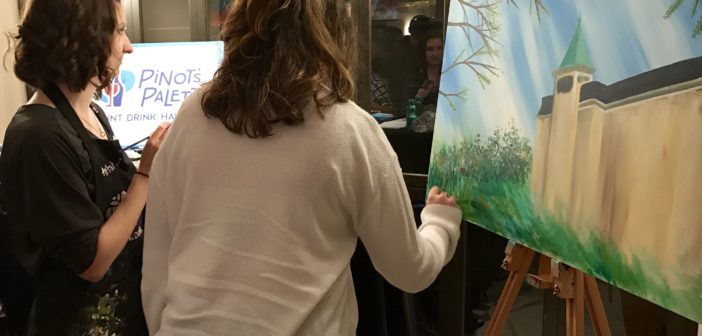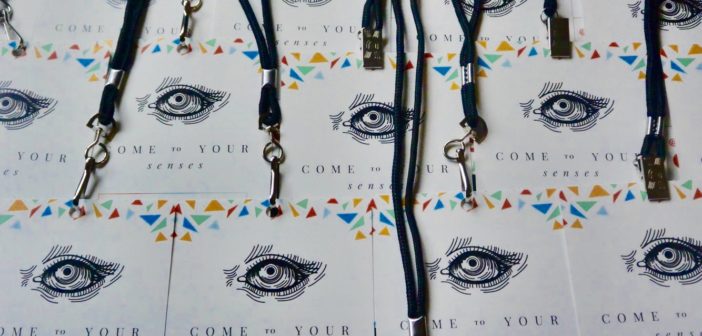“Let’s all enjoy this cookie together,” said Nathan Ronchetti. This was a memorable moment of NCC’s TEDx event Friday night as Nathan and Paige Ronchetti (08′) told the audience to take the cookie out of the provided “swag bags” to put emphasis on the sense of taste, and, likewise, the theme “Come to Your Senses.”
The two played hosts to the event with laughter and fun, the banter between them lighting up the stage and inviting the audience to pay close attention to their senses throughout the night.
Ashely Eisenmenger started off the event with an anecdote on what her senses are like. Eisenmenger was born prematurely, causing her to be blind. She talked about how perspective is powerful, asking the audience to close their eyes. Throughout the talk she touched upon positivity and how this word affects her life.
She reminds the audience that she never asked them to open their eyes or metaphorically take off their “blindfold.” Eisenmenger ends with a memorable saying, “the difference for me is my blindfold never comes off, and I wouldn’t have it any other way.”
Next, alum Nikki Young (’15) taught the audience what trauma does to the body. “We talk about the body as we talk about trauma because trauma exists in the body,” Young added. “The body reacts as if the event is happening, it’s like a wound that never heals.”
Young talked about how a person’s senses can trigger this past fight or flight reaction in their body. Young discussed how some can feel the flashback of Sept. 11, 2001, as they walk into an airport. When we feel trauma, the cognitive part of our brain shuts down, and somehow speaking becomes hard, she said.
Next up was Davonte Sanders-Funches. “I was always taught to be strong in this world,” were the first words spoken by Sanders-Funches. He focused on the constant strength black communities feel the need to have.
His talk, “The Grounding of Black Bodies,” focused on how black communities should be OK with asking for help “when we fall through the cracks.” That asking for help needs to be talked about and normalized in modern culture.
“Soul: The Sense of Being” was the title of Mae Seely-Sylvester’s (’62) talk about a major turning point in her life. “What is the worst thing that can happen” was a question Seely-Sylvester often asked herself.
She told a story about her time in Prague and how this time was the start of her discovery of the “sense of being.” She said she wants people to be able to find their core and purpose within themselves, although many people never achieve this.
“We can’t talk about souls without acknowledging that sometimes it can turn to its dark side,” said Seely-Sylvester. “How do we keep our flame bright?” she asked. Over the course of her talk she touched upon the different aspects of the human soul: grace, light, darkness and forgiveness.
Jarred DeHerrera, NCC student and managing editor of The Chronicle/ncclinked.com, broke down bias with his talk on ” A War on the Media.” He discussed the media from a different perspective, saying it is about seeing something from a different angle.
What came next was a tweet by President Donald Trump about how certain media outlets are a danger to the American people.
“I’m not here to talk politics, so put down those angry Facebook fingers,” said DeHerrera, eliciting laughter from the audience.
He said his experience in journalism has changed his perspective on the media and that a difference in opinion is normal and OK, but you also need to listen and understand different perspectives in order to grow.
Afterward, YouTube star “Kid President” broke up the talks in a video of how to disagree with people, relating to DeHerrera’s point on how “It’s OK to disagree, but not OK to be mean.” Pretty close. Right?
On a different note, Kelsey Staudacher (’09) discussed how U.S. organic food Is produced and why it is better. “Unearthing the Truth About Organics” compared big organic food companies to how other countries produce organic food. It showed the switch to healthier and environmentally better food production and the importance of educating the audience on what the difference is between organic options vs. the other.
Utilizing our sight, David Johnson (’07) talked to the audience about expanding their views. One thing Johnson wanted the audience to take away from the talk was, “focus frames the future.”
“I basically grew up in two cultures,” said Johnson living at North Central College as well as the south side of Chicago in his younger years. This formed his perspective of the world. As a photographer, he discussed how out of the millions of photos uploaded a day, there are photos out there that matter and can change the world. His photography took him all over the world, and this focus on people has framed his own future.
Jennifer Thomas (’17) guided the audience through storytelling, sharing a story about her personal experience in prison and the injustices she saw during that time. She talked about her own research on the subject which compares the American prison system to other countries.
“It is time for us to open our eyes to the fact that we need to reform our prison system,” said Thomas. She said she believes that America can do better and improve on the current conditions.
“The People We Praise” speaker Reese Richardson (’19) started off with an analysis of Mother Teresa. He discussed the Catholic background and how Mother Teresa represents charity in many ways, but also, through history, contradicts herself. His main point was to look upon the accomplishments of people rather than who they are as a person. If we do this, he said, we will become a more critical and informed society.
“What is an IRA?” Nathan asked Paige before Ryan Decker (’07) took the stage to talk about “The Fallout of Financial Illiteracy.” She joked and answered, “letters.” Decker informed the audience about the lack of financial literacy college students have, more specifically liberal arts students.
Personal finances are one of the most challenging topics to discuss, Decker says. People just don’t talk about it. “With financial literacy, if it is not happening at home, it’s not happening at all,” said Decker.
He taught the audience how to talk about money, salary, and how to utilize this in everyday life. He pushed the importance of spreading knowledge and getting the conversation started.
“Don’t Be Afraid of your Fears:” this ironic statement provided a talk from Joshua Lahey (’17) on his own list of fears. After being diagnosed with clinical anxiety and depression, Lahey found an exercise which had him write down his own fears, and later embrace them. He picked off his “irrational” fears one by one, including public speaking.
To close off the night, Kristen Clifford (’03) and Donna Marino used the audiences’ ears to experience “Sound Bites.” The two used science to show how sound can affect your breathing and heart rate. A 30-second silent pause made the room stand still. Clifford ended this silence by saying how awkward the silence made her feel.
So what does noise pollution do? It can cause anxiety among many other problems. “When we close the office at night it is as if peace and serenity are restored,” said Marino. This noise calms and reduces this anxiety.
Finally, the music group, “Sleeping at Last” ended the night with Sonata Problem, coming full circle in a performance that used hearing as the event’s first and last sense.
Smell, touch, taste, sight and hearing were all utilized in this TEDx event. Whether it was through painting Old Main with Pinot’s Palette, grabbing a cup of coffee with Enactus, or more deeply, changing a perspective.

